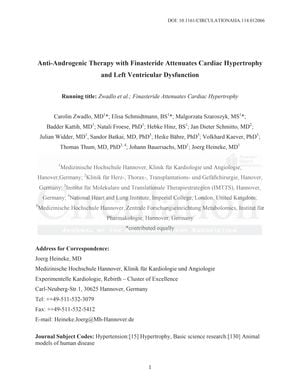TLDR Finasteride helps reduce heart issues and improves heart function.
The study found that finasteride, an antiandrogenic therapy commonly used to treat hair loss and benign prostate hyperplasia, can reduce cardiac hypertrophy and left ventricular dysfunction in male and female mice. Finasteride was found to reduce DHT levels and androgen receptor activation, leading to reduced heart weight, cardiomyocyte cross-sectional area, and fibrosis in mice with pressure overload-induced cardiac hypertrophy. Additionally, finasteride improved left ventricular systolic function and reduced cardiac dilation. The study suggests that finasteride may act through a similar cellular target as other antiandrogenic therapies, such as those used to treat prostate cancer.
 75 citations
,
January 2014 in “Korean Journal of Urology”
75 citations
,
January 2014 in “Korean Journal of Urology” 5α-reductase inhibitors can cause sexual problems, higher risk of aggressive prostate cancer, and depression.
 14 citations
,
May 2012 in “Endocrine Research”
14 citations
,
May 2012 in “Endocrine Research” The same hormone can affect gene expression differently in various tissues, which could lead to new treatments for conditions like hair loss.
 260 citations
,
July 2010 in “Cell”
260 citations
,
July 2010 in “Cell” Mutations in the SRD5A3 gene cause a new type of glycosylation disorder by blocking the production of a molecule necessary for protein glycosylation.
155 citations
,
October 2002 in “The FASEB Journal” Heart-specific steroid metabolism is crucial in cardiac hypertrophy.
 211 citations
,
November 1990 in “The Journal of Steroid Biochemistry and Molecular Biology”
211 citations
,
November 1990 in “The Journal of Steroid Biochemistry and Molecular Biology” Finasteride effectively treats BPH, but needs more trials to understand potential.
 13 citations
,
August 2018 in “Journal of Molecular and Cellular Cardiology”
13 citations
,
August 2018 in “Journal of Molecular and Cellular Cardiology” Finasteride improves heart function and repairs damage after heart attack in mice.
 56 citations
,
January 2015 in “Circulation”
56 citations
,
January 2015 in “Circulation” Finasteride helps reduce heart issues and improves heart function.
 30 citations
,
August 1992 in “The Journal of Clinical Endocrinology and Metabolism”
30 citations
,
August 1992 in “The Journal of Clinical Endocrinology and Metabolism” Finasteride doesn't affect hormone levels in normal men.









